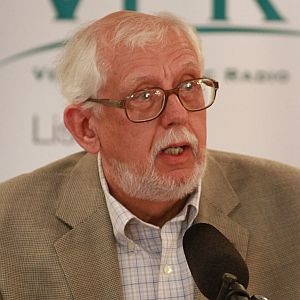 Every year we invite commentators to write on the same theme and share their essays at a brunch, which we record to feature a sampler of the event later on the air. This year’s topic was "When Worlds Collide" and it got commentator Tom Slayton thinking about politics and change in Vermont.
Every year we invite commentators to write on the same theme and share their essays at a brunch, which we record to feature a sampler of the event later on the air. This year’s topic was "When Worlds Collide" and it got commentator Tom Slayton thinking about politics and change in Vermont.
(Slayton) Hello. I’m Tom Slayton and my piece is entitled, "When Political Worlds Collide."
Imagine, if you will, a Vermont that is a bastion of conservative Republican orthodoxy, a Vermont where many homes still have no electricity or indoor plumbing. This is a Vermont with no Interstate highway system and no Vermont Public Radio, and most of the state receives only the none-too-sharp black-and-white signal of a single television station.
The Legislature in this Vermont is one of the most grossly malapportioned deliberative bodies in the western world, and the state government it oversees is predominately and happily quiescent.
This Vermont is beautiful, as is today’s Vermont. But the economy, especially in northern sections, is stagnant and young people almost universally feel they must leave if they want to have any opportunity to advance in life.
This Vermont is not imaginary. It’s the Vermont I grew up in.
But that began to change in 1960 when a young, charismatic Burlington lawyer named Phil Hoff was elected to the state legislature. And change came for real and in earnest in 1962, when Hoff astounded the state – and the nation by defeating the incumbent Republican, F. Ray Keyser, and becoming the first Democratic governor elected in this state in more than 100 years.
The complete story is told in what is probably the best book of Vermont political history produced in recent years. The title is "Philip Hoff: How Red Changed to Blue in the Green Mountain State," by Anthony Marro, Stephen Terry and Sam Hand. It’s an accurate and brilliantly detailed story that Tony, Steve and I experienced first-hand, as young reporters during those years.
One of the things that struck me as I read this book and thought about about the Hoff saga, was that Phil Hoff managed to break most of the established and conventional "rules" of Vermont politics, as he rose to the governor’s office. (Remember, these are the rules of 1960…)
First, he was from "away" – in his case Connecticut. Second, he ignored the time honored stepladder of Vermont politics – Hoff ran for governor after a single term in the Vermont House – and won! And perhaps most significantly, he ran as a Democrat in a state that was so solidly Republican that being anything else was widely seen as a one-way ticket to political oblivion.
And yet he rose to the governor’s office with astonishing rapidity and while there, helped change Vermont forever.
And so I wonder: did that older, quieter, more isolated Vermont actually anticipate and hope for change? And was this newer, livelier Vermont – the one that we live in today – already there in some form, just waiting to be born?
See the When Worlds Collide main page.